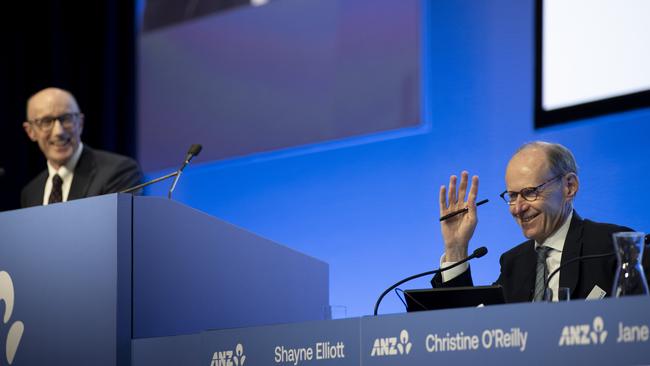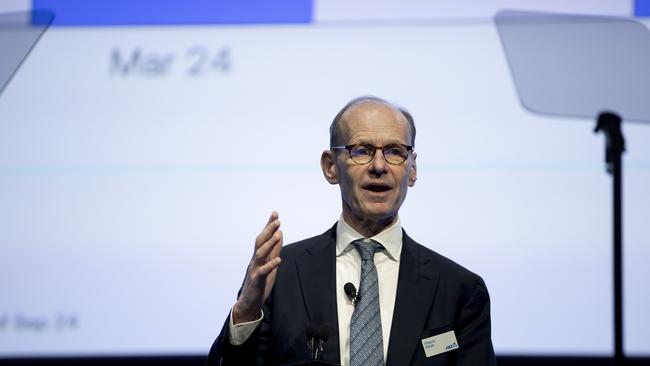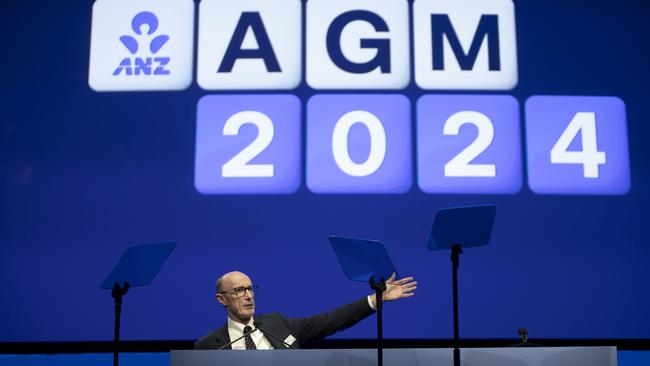First strike for ANZ anger over banking scandals
ANZ CEO Shayne Elliott has withdrawn an attempt to secure a bonus from shareholders in an attempt to avoid a blow-up at the lending major’s AGM.

Business
Don't miss out on the headlines from Business. Followed categories will be added to My News.
ANZ shareholders delivered a sharp rebuke to its board at a marathon annual meeting on Thursday, handing it a ‘‘first strike’’ as chief executive Shayne Elliott attempted to mollify investors by surrendering his $3.2m bonus.
At the five-hour meeting in Melbourne, ANZ tried to quell shareholder anger over a $250m regulatory penalty handed to the bank in recent months.
More than 38 per cent of shareholders voted against the bank’s remuneration report.
The bank faces the prospect of a second strike next year amid expectations ANZ will face a flurry of enforcement actions from regulators before its next AGM.
A second strike could see ANZ’s board face a spill motion.
Westpac investors delivered a strike against the bank in 2021.
Thursday’s shareholder drubbing came after the Australian Securities & Investments Commission revealed earlier this year it was investigating ANZ over alleged market manipulation in a $14bn government bond deal.
The Australian also revealed the bank is facing a further ASIC probe over charging fees to deceased customers.
ANZ chair Paul O’Sullivan said the scandals made it “difficult to judge our performance”, noting ANZ had posted its second-highest profit since 2017 and highest revenues, pointing to its institutional banking arm as a standout operation.
He said ANZ had faced a “mixed year”, noting that “significant achievements” were “overshadowed by issues relating to our management”.

Acknowledging the strike, Mr O’Sullivan said ANZ considered the best interests of shareholders when deciding performance bonuses for its executives.
Mr Elliott and several other executives had their bonuses clipped as a result of a $250m capital penalty imposed by the Australian Prudential Regulation Authority over concerns with ANZ’s non-financial risk management.
Mr O’Sullivan said ANZ had a good track record managing financial risk, but the bank was “still building capability when it comes to our management of non-financial risk”. He said recent events in the bank’s markets business “highlighted the need to do much more” in non-financial risk improvement.
Mr O’Sullivan said ANZ was continuing to co-operate with ASIC over the investigation into the alleged market manipulation.
He revealed that Mr Elliott had “decided to forfeit this year’s long-term variable remuneration”.
He said the board was considering further adjustments in executive remuneration, after weeks of meetings with key shareholders.
Mr O’Sullivan and a collection of ANZ shareholders applauded Mr Elliott’s move to surrender his long-term variable remuneration, which had a total value of $3.2m deferred over four to six years.
Mr O’Sullivan said if new information came to light the board may “freeze or reduce future vesting to accountable executives”.
But Mr O’Sullivan warned the bank would not disclose key details of investigations into troubles in its markets business.
In response to questions from shareholders, Mr O’Sullivan said revealing details of a Freehills investigation into ANZ was “not in the interests of shareholders”.
Instead the chair said he would act in the best interests of shareholders and the bank, noting the bank would only hand over a copy of its Oliver Wyman review to APRA.
However, Mr O’Sullivan said ANZ would publish a summary of the findings of the Oliver Wyman review, noting it was “important that people get a sense as to what we’ve learned”.
Mr Elliott told shareholders that the cost of the bank’s response to the scandal in its markets business was “in the millions of dollars”.
He said ANZ “didn’t always get everything right”.
The chief executive was speaking for the first time since his successor, HSBC banker Nuno Matos, was announced last week.
Mr Elliott, who has led ANZ for nine years, was not present at the succession announcement last week, which was led by Mr O’Sullivan.
Mr Elliott said he would ensure an “orderly” handover to Mr Matos, who takes on the top job in July next year.
Mr Elliott faces the loss of his share rights grant this year, after withdrawing the motion.
He said ANZ was “firmly committed to addressing concerns raised around non-financial risk management and getting changes embedded to improve the way we manage the bank”.

Mr Elliott said he believed ANZ had achieved several major transformations in his tenure, simplifying its operations and rolling out new technology platforms. They included the launch and rollout of ANZ Plus, an attempt to replace the bank’s ageing technology infrastructure.
Mr Elliott also pointed to the $4.9bn Suncorp Bank acquisition, which was now “performing even better than when announced two years ago”.
The ANZ boss noted the bank was confident it would book synergies from the deal that were “larger and earlier than planned”.
Mr Elliott had previously signalled he wanted to stay in the top job at ANZ to supervise the integration of Suncorp Bank.
The deal has expanded ANZ’s retail bank business, with more than one million new customers and a larger presence in Queensland.
ANZ has pledged to not close any Suncorp branches for three years, but Mr Elliott warned that the bank would still look at its other branches, saying they had to generate a profit “so we can continue to grow and provide services”.
Mr Elliott said ANZ was instead trying to find ways to provide services from its regional branches at a “reasonable cost to shareholders”, including cutting operating hours.
Mr Elliott said ANZ’s mortgage business was in robust health, despite the cost of living pressures and stubbornly high interest rates.
He said loan hardship cases had risen to almost four in every 1000 people over the last year, while for small business customers it was now two in every 1000.
ANZ shares closed down 2.55 per cent, amid a heavy sell-off on the broader ASX, with 75c shaved off shares to finish at $28.61.
More Coverage
Originally published as First strike for ANZ anger over banking scandals





